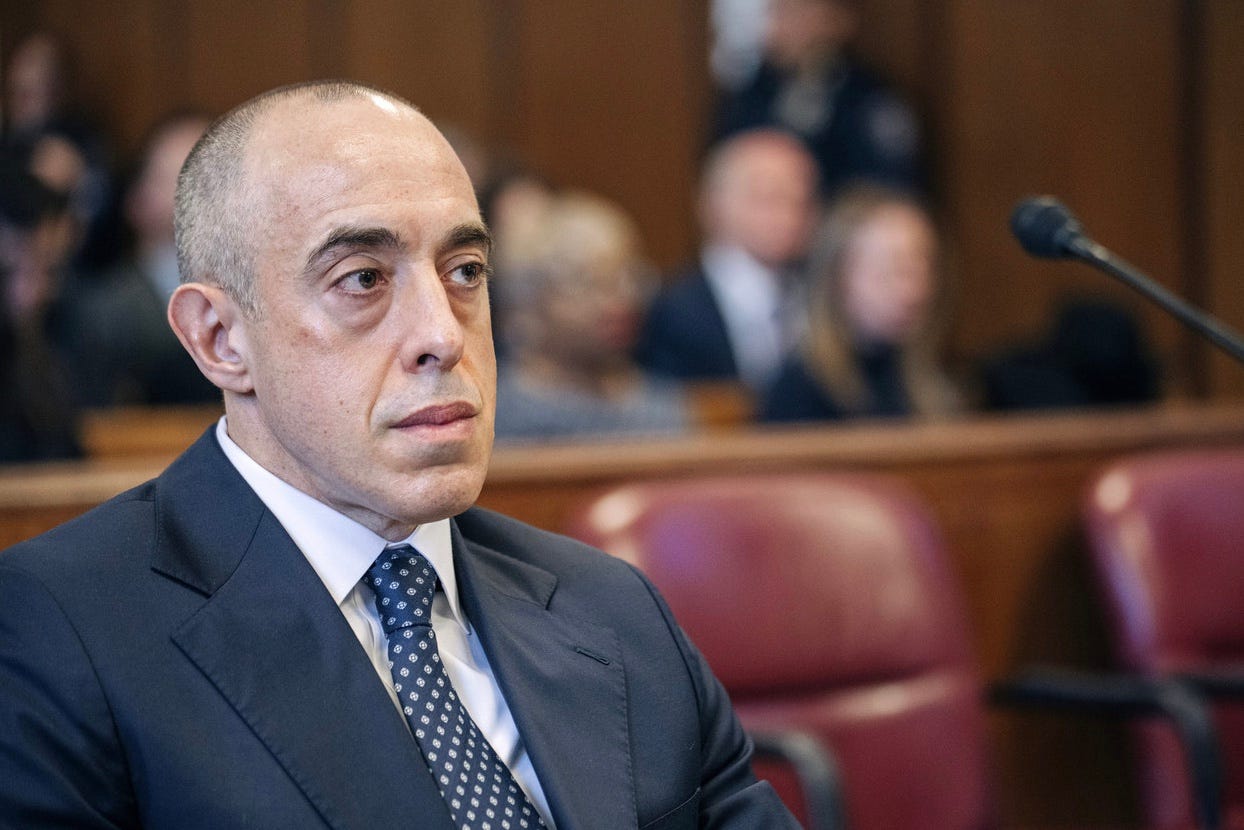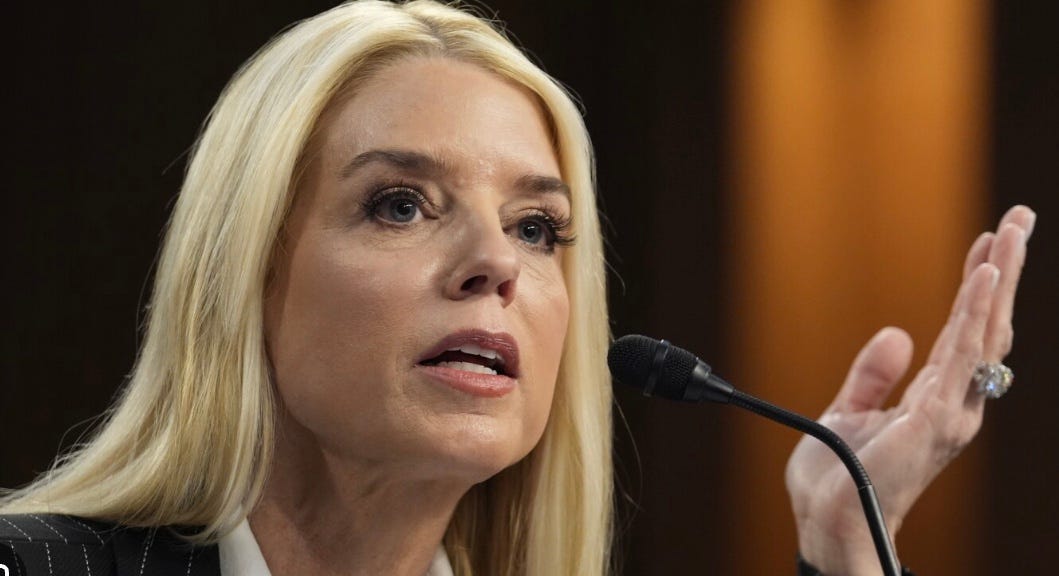Robert Jackson was solicitor general of the United States, attorney general of the United States, associate justice of the United States Supreme Court and the chief prosecutor of the United States of America at the Nuremberg war crimes tribunal.
He was a most distinguished jurist!
I would ask that you read a speech and pass it on.
Information is power, and it is essential for every American citizen to understand there is a great internal struggle underway at the Department of Justice, which belongs to the American people — not Trump’s gang of menacing incompetence and corruption.
The dismissal of federal charges against Eric Adams, the corrupt mayor of NYC, by the corrupt Trump/Bondi/Bove/Patel Department of Justice is a seminal moment and a brazen one in the lawless early days of the Trump regime.
It should not be diminished, dismissed or ignored.
The Department of Justice is under siege, and the assault is being met by principled acts of defiance.
Danielle Sassoon was the acting U.S. attorney for the Southern District of New York, and a former law clerk to Antonin Scalia. She refused to comply with the Justice Department's order to drop the corruption case against Mayor Adams.
Assistant US Attorney Hagan Scotten, a line prosecutor who also resigned, was a former law clerk for Chief Justice John Roberts.
His response to the orders of DOJ/MAGA henchman Emil Bove are a classic expression of American principle, defiance and idealism. They should inspire you.
Here they are:
Any assistant U.S. attorney would know that our laws and traditions do not allow using the prosecutorial power to influence other citizens, much less elected officials, in this way.
If no lawyer within earshot of the President is willing to give him that advice, then I expect you will eventually find someone who is enough of a fool, or enough of a coward, to file your motion. But it was never going to be me.
Justice Jackson would have been pleased to know Ms. Sassoon and Mr. Scotten.
He would have held Pam Bondi, Matt Gaetz, Donald Trump, Bill Barr, Emil Bove and his legion of shady lawyers in utter contempt.
Robert Jackson delivered this speech to a room full of federal prosecutors and district attorneys in 1940.
Five years later, he would rise for the United States at Nuremberg.
Today, JD Vance rises for the AFD, which rises for the cause that Jackson prosecuted.
Times, they are a changing.
Yet, we are armed by the words and deeds of the Americans who have come before, and left to us a legacy that demands our participation in defense of the trust and inheritance. It is our responsibility to carry on until it can be handed off.
A terrible moment has arrived in America.
It will be opposed because it must be opposed.
It is essential to understand that saying, “No” to what is happening can be enough for now, but it must be girded with a belief in something that makes the opposition worthy.
The belief is a simple faith.
It is an American faith, and without it, Trump cannot be effectively opposed or stopped.
Trump will be stopped because he must be stopped.
The American people are slow to anger and slower to rise, but Donald Trump is making a terrible miscalculation if he thinks that his doings are invisible.
They are not.
This madness will be opposed because it must be opposed. The American way of life is reliant on justice. The pursuit of justice is the lifeblood of America. Should the day ever come when there is no chance to oppose the wrong, corrupt and illegal in America, then it will be the case that America has died.
Let us oppose this possibility because we must.
Below is why:
It would probably be within the range of that exaggeration permitted in Washington to say that assembled in this room is one of the most powerful peace-time forces known to our country.
The prosecutor has more control over life, liberty, and reputation than any other person in America. His discretion is tremendous.
He can have citizens investigated and, if he is that kind of person, he can have this done to the tune of public statements and veiled or unveiled intimations
Or, the prosecutor may choose a more subtle course and simply have a citizen's friends interviewed.
The prosecutor can order arrests, present cases to the grand jury in secret session, and on the basis of his one-sided presentation of the facts, can cause the citizen to be indicted and held for trial.
He may dismiss the case before trial, in which case the defense never has a chance to be heard.
Or, he may go on with a public trial.
If he obtains a conviction, the prosecutor can still make recommendations as to sentence, as to whether the prisoner should get probation or a suspended sentence, and after he is put away, as to whether he is a fit subject for parole.
While the prosecutor at his best is one of the most beneficent forces in our society, when he acts from malice or other base motives, he is one of the worst.
These powers have been granted to our law enforcement agencies because it seems necessary that such a power to prosecute be lodged somewhere.
This authority has been granted by people who really wanted the right thing done — wanted crime eliminated, but also wanted the best in our American traditions preserved.
Because of this immense power to strike at citizens, not with mere individual strength, but with all the force of government itself, the post of federal district attorney from the very beginning has been safeguarded by presidential appointment, requiring confirmation of the Senate of the United States.
You are thus required to win an expression of confidence in your character by both the legislative and the executive branches of the government before assuming the responsibilities of a federal prosecutor.
…There is a most important reason why the prosecutor should have, as nearly as possible, a detached and impartial view of all groups in his community.
Law enforcement is not automatic.
It isn't blind.
One of the greatest difficulties of the position of prosecutor is that he must pick his cases, because no prosecutor can even investigate all of the eases in which he receives complaints.
If the Department of Justice were to make even a pretense of reaching every probable violation of federal law, ten times its present staff would be inadequate.
We know that no local police force can strictly enforce the traffic laws, or it would arrest half the driving population on any given morning,
What every prosecutor is practically required to do is to select the cases for prosecution and to select those in which the offense is the most flagrant, the public harm the greatest, and the proof the most certain.
If the prosecutor is obliged to choose his cases, it follows that he can choose his defendants.
Therein is the most dangerous power of the prosecutor: that he will pick people that he thinks he should get, rather than pick cases that need to be prosecuted.
With the law books filled with a great assortment of crimes, a prosecutor stands a fair chance of finding at least a technical violation of some act on the part of almost anyone.
In such a case, it is not a question of discovering the commission of a crime and then looking for the man who has committed it, it is a question of picking the man and then searching the law books, or putting investigators to work, to pin some offense on him.
It is in this realm — in which the prosecutor picks some person whom he dislikes or desires to embarrass, or selects some group of unpopular persons and then looks for an offense, that the greatest danger of abuse of prosecuting power lies.
It is here that law enforcement becomes personal, and the real crime becomes that of being unpopular with the predominant or governing group, being attached to the wrong political views, or being personally obnoxious to or in the way of the prosecutor himself.
In times of fear or hysteria, political, racial, religious, social, and economic groups, often from the best of motives, cry for the scalps of individuals or groups because they do not like their views.
Particularly do we need to be dispassionate and courageous in those cases which deal with so called "subversive activities."
They are dangerous to civil liberty because the prosecutor has no definite standards to determine what constitutes a "subversive activity," such as we have for murder or larceny.
Activities which seem benevolent and helpful to wage earners, persons on relief, or those who are disadvantaged in the struggle for existence may be regarded as "subversive" by those whose property interests might be burdened or affected thereby.
Those who are in office are apt to regard as "subversive" the activities of any of those who would bring about a change of administration.
Some of our soundest constitutional doctrines were once punished as subversive.
We must not forget that it was not so long ago that both the term "Republican" and the term "Democrat" were epithets with sinister meaning to denote persons of radical tendencies that were "subversive" of the order of things then dominant….
The qualities of a good prosecutor are as elusive and as impossible to define as those which mark a gentleman.
And those who need to be told would not understand it anyway.
A sensitiveness to fair play and sportsmanship is perhaps the best protection against the abuse of power, and the citizen's safety lies in the prosecutor who tempers zeal with human kindness, who seeks truth and not victims, who serves the law and not factional purposes, and who approaches his task with humility.







I attended a protest today in my local city. There were several hundred people there. Lots of supportive horn beeps from cars. It felt good to have a little agency. Glad to see that happening all over the country. We are going to have to wage a years-long struggle against the forces of evil in this country. We will do so peacefully, but they will not. It will require bravery on our part. It will require sacrifice that now we cannot imagine. Surrender is not an option, and it is not in our vocabulary. We are literally staring dictatorship in the face, and we must not flinch or look away. These evil people will have tools at their disposal Hitler could only have dreamed of: AI, nukes, a high tech surveillance state. Unless, of course, we stop them. This is existential.
Bondi got a pass because she is not as obviously murderous as most of the other T choices like Bobby and Tulsi. But the record shows she is as corrupt as any of them. Lord help us, while we make war to help ourselves.